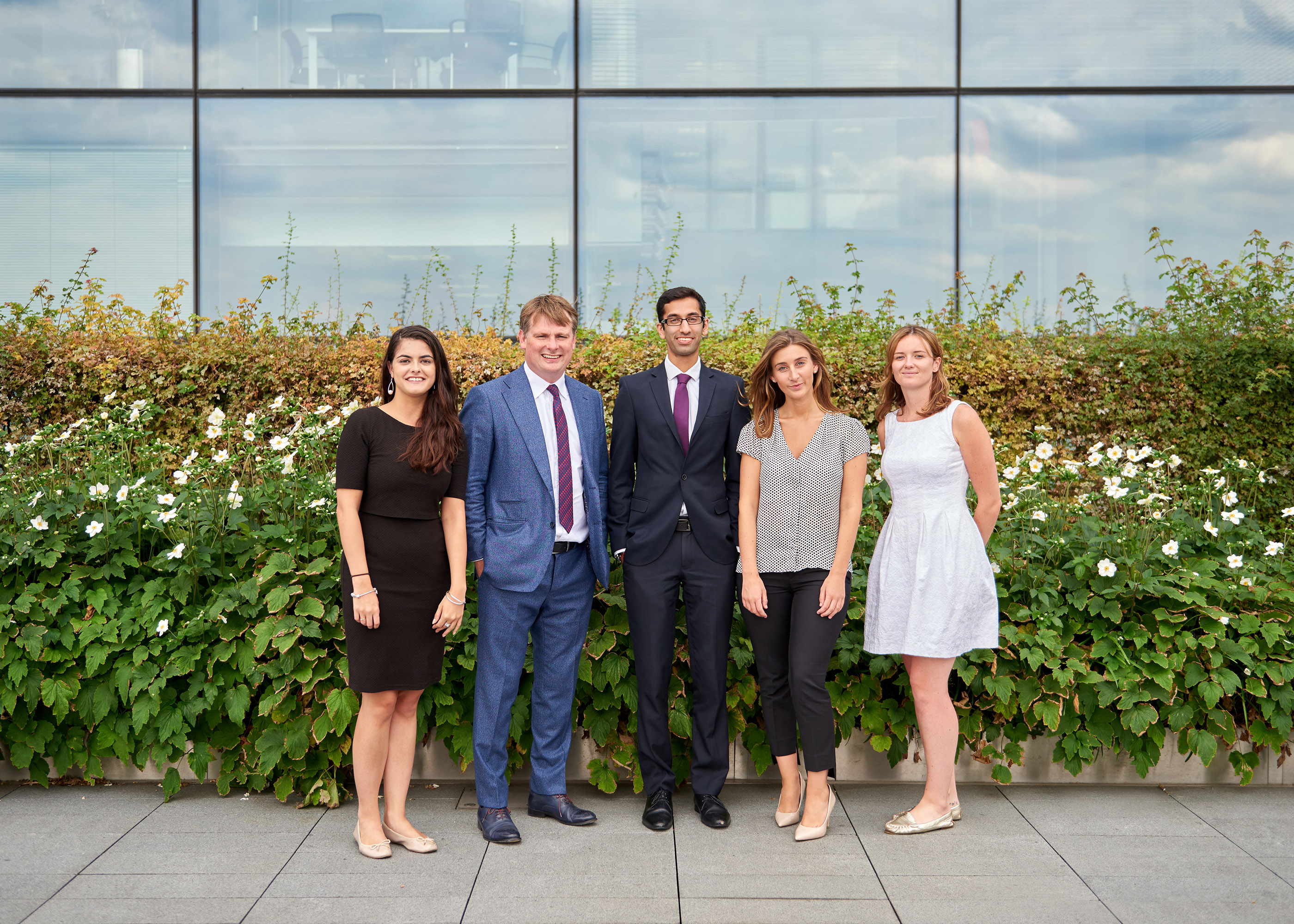
A brilliant level of client contact from an early stage and a nurturing environment where each supervisor looks out for your best interests.
Their plush, gleaming offices and rigorous application criteria might give the impression that all City law firms are largely the same, but the briefest look into their unique cultures and clientele reveals just how apart from each other they really are. Perhaps the greatest contrast in approach is that between the US firms established in London and their UK-headquartered counterparts, and one of the most prestigious among the former is Akin Gump Strauss Hauer & Feld, which as one would expect, runs its award-winning training contract along different principles to its magic circle competitors.
“There is a clear divide between the programmes at larger UK firms and the style of training at a US firm such as Akin Gump, where the intake is smaller and the training contract involves more responsibility from day one,” explains Vance Chapman, training principal. “We supervise and look after our trainees, but they are treated almost as associates from an early stage. People who adapt to that ethos well are those who are self-starting, driven, and won’t feel too nervous about being thrown in at the deep end.”

The firm’s entrepreneurial philosophy dates from its founding in Dallas, Texas in 1945 by Robert Strauss and Richard Gump. Strauss, the son of Jewish immigrants from Germany, rose from humble beginnings to serve as an FBI agent during the Second World War, and went on to become an eminent lawyer and political figure, working directly with presidents Jimmy Carter, Ronald Reagan and George HW Bush. The firm’s rise mirrors its founder’s trajectory, maintaining its Texan roots but having long since established its headquarters in Washington DC, where it is well known for having influence on Capitol Hill. And like Strauss’ former presidential bosses, it does not limit itself to achievements in domestic affairs – internationally, Akin Gump is adviser to the governments of Japan, South Korea and Nicaragua.
We are more streamlined than some other firms and have a smaller trainee intake, so we offer a very different training experience.
With over 900 lawyers across 20 offices dotting the globe, the firm is an international giant. However, its vast reach does not equate to a sprawling London office hiring dozens of trainees a year. “One of our key differentiators from other US firms in the City is size,” explains Vicky Widdows, director of international legal recruiting and development. “We are more streamlined than some other firms and have a smaller trainee intake, so we offer a very different training experience. The advantage of having a growing but relatively small training programme is that there is a lot of flexibility. One of the things that people who have come through our programme have always appreciated is that there is an ongoing conversation about the future, as well as their experiences in each seat. We foster a culture in which people are valued as individuals and our flexibility, combined with a wide variety of practice areas to choose from, means that trainees usually secure their first-choice seats.”
The London office’s training programme launched in 2014 following a merger with Bingham McCutchen, in which the latter’s well-established training was carried over into the combined firm. This means that while training contracts are a relatively recent development for Akin Gump, they are underpinned by years of experience and knowledge. “The programme has grown alongside the business, from a standing start of a single trainee to an annual intake of five or six, currently,” explains Vance, who joined Akin Gump as part of the merger and was key in bringing training expertise across from Bingham. “We are a US firm, so in the early stages UK colleagues led the way in educating the wider partnership about the training process on this side of the Atlantic and they quickly saw the value of the programme – I actually think that some of the US partners are a little jealous of the way we do things here, compared to the States!”
Training is structured around the involvement of both partners and recruitment specialists. “As training principal, I work closely with Vicky, who heads a team of three who deal with all aspects of recruitment and trainee development,” Vance continues. “We are joined by two other partners for our regular training committee meetings, where we discuss ideas and strategy for the team to implement. I also report to the managing partner and get the firm’s hierarchy involved in the recruitment of candidates – many of our lawyers give presentations to vacation schemers and trainees.”
You are treated as an individual and the training experience is tailored to your needs.
The firm’s vacation scheme is an important part of the process, enabling candidates to gain a taste of what trainee life is like and weigh up whether the culture is a good fit for them. For second-seat trainee Lucy Jordan, the experience confirmed that the direction she had chosen was the right one. “I knew that I wanted to do something financial and corporate, and I had an interest in the energy sector,” she explains. “And because I studied Russian at university, I was keen to join a firm with a Moscow presence. As a truly international firm, Akin Gump leapt out at me during my research, so I applied for a place on the vacation scheme and was interviewed by Vicky and Vance. The reality of the job was among the things discussed – the self-starting nature of being a trainee at the firm was emphasised, as well as the opportunities for early responsibility and flexibility. I really enjoyed my experience on the scheme, which was split between the corporate and litigation departments. I was exposed to a wide variety of work which more than lived up to what I was looking for.”
Lucy secured her training contract following the vacation scheme and then studied for her GDL and LPC. “I was in regular contact with the legal recruitment and development team and the Christmas before I joined, they arranged a social for my intake to meet the current trainees and catch up with the recruiters,” she recalls. “This meant that I already knew lots of people at the firm before I started. I felt well prepared for my first day – I knew which seat I was going to be in and who my supervisor was already.”

Now a second-seat trainee in the oil and gas team (her first was in litigation), Lucy is enjoying the benefits of flexible, personalised training. “I’m going to Moscow for three months from September,” she enthuses. “I speak Russian and expressed an interest in doing this from the beginning, and the firm was able to give me the opportunity despite it not being a fixed secondment that happens more regularly like our Hong Kong secondment. The training contract has really enabled me to pursue the interests that made me initially want to apply to Akin Gump – even in litigation, many of the cases I worked on were in the energy sector.”
Individualising each trainee’s experience is key. “We listen to our trainees and don’t just treat them as commodities,” Vicky explains. “Trainees are given both responsibility and support, so there is a healthy mix of learning by doing and being shown the ropes by more experienced lawyers.”
Lucy agrees: “It is very personalised, which is something that I felt throughout the recruitment process too – you are treated as an individual and the training experience is tailored to your needs. I have monthly catch-ups with Vicky to discuss how I’m getting on, what is happening going forward and any concerns that I might have, and I think that ethos is quite unique.”
We listen to our trainees and don’t just treat them as commodities.
Alongside tailoring the programme to trainees’ individual needs, early responsibility is the other pillar of the firm’s training approach. “I think I definitely enjoy more responsibility than trainees I know at other firms and have been fully involved in all the deals I’ve worked on,” Lucy continues. “During my litigation seat my tasks included drafting letters, conducting legal research and helping out with witness statements. I was also lucky enough to work on two trials during the seat, which enabled me to gain great court exposure. I have gained a lot of drafting experience during my corporate seat, including board minutes and resolutions, letters to clients and other parties, and various types of agreements. I also have regular partner contact because our teams are quite small. For example, for the matter I’m working on right now, I am in a team of three alongside an associate and a partner. Partners will also regularly come up to me directly to ask me to help them with different pieces of work.”
The model is quite different to that of many of the firm’s competitors. “Teams are streamlined in comparison to those at many UK firms,” observes Vance. “We tend not to have large groupings consisting of a senior partner, junior partner, counsel, senior associate, junior associate and a couple of trainees. At Akin Gump, a team is far more likely to comprise a partner, one or two associates and a trainee. This is the best way to serve our client base – our teams are built to handle a lot of cross-practice work, which involves lawyers from the firm’s different departments working closely together.”
This also means that lawyers experience a wide variety of work from trainee level up. “One of the distinguishing aspects of our practice is the high proportion of cradle-to-grave fund work that we handle,” continues Vance. “For example, as a corporate partner I do different types of transactions for fund clients, which involves all kinds of M&A and capital markets work – financial restructurings alongside our market leading restructuring practice, joint ventures, acquisitions, sales and so on. This means that while most of our corporate work comes from a certain type of client, the transactions themselves vary widely, so lawyers are not siloed into one area as they are at some other firms. The same is true in our other practice groups, including our large emerging markets practice and energy specialism within London.”

For Lucy, the tailored, flexible training and early responsibility have made for a “thoroughly enjoyable” experience so far, not least because diving in at the deep end actually takes place within a highly supportive environment: “It’s very friendly – there is a lovely culture at the firm. Everyone is willing to take the time to explain tasks and how they fit into wider projects, and also to give you the necessary time to read up on things, which is particularly important when you are a first-seat trainee.” Vicky agrees: “The firm itself is very collegiate, with no comparable hierarchy to what you would find at many UK firms, and this creates a flexible, meritocratic environment.”
Few other firms can offer the tailored training that results from a small intake while also boasting size, influence and global reach. “If you are looking for a stimulating, exciting legal career that will keep your mind busy with complex problems and creative solutions, Akin Gump offers the perfect environment in which you can develop, by experiencing work that is interesting and will provide a sense of achievement,” sums up Vance. “If you are a self-starter who is happy with responsibility, we can help you to build a great career with us.”
By Josh Richman

Best Trainer – US Firm in the City
A brilliant level of client contact from an early stage and a nurturing environment where each supervisor looks out for your best interests.

